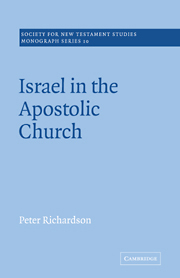III - POLITICAL FACTORS IN THE SEPARATION
Published online by Cambridge University Press: 05 March 2010
Summary
INTRODUCTION
There are a number of external factors which must be assessed in a documentation of the Church's growing separation from Israel: the relationship of nationalistic movements to local Palestinian authority; the relation of the Church to this nationalism; and the relation of the Church and the Diaspora to local and Roman government. The authorities’ attitude to Christians and Jews influences the need for identification and separation in the consciousness of each as, for example, in the conflicts between Rome and a Judaism temporarily swayed by a nationalistic fervour. For this question Roman law is an important factor. The events requiring discussion are, therefore, the wars of A.D. 66–73 and A.D. 132–5; the alleged persecutions by the Emperors from Claudius to Hadrian; local Jewish persecutions including the Synagogue Ban. It will be argued that none of these traumatic incidents provides either the sharp break or the grounds for the break which is under examination. Their importance lies in the encouragement they provide for each of Judaism and Christianity to go its own way, and in the opportunity for self-assessment. The incidents also provide grounds for later polemic and apologetic justification for the break as it develops, but they are symptoms and not first causes of the rupture.
JEWISH REVOLTS
The revolt led by Bar Cochba in A.D. 132 was initiated by extremely provocative action of Hadrian towards the Jews: the proscription of circumcision and the establishment of Jeru- salem as a thoroughly hellenized city, Aelia Capitolina. The effects of this uprising have been generally underrated.
- Type
- Chapter
- Information
- Israel in the Apostolic Church , pp. 33 - 47Publisher: Cambridge University PressPrint publication year: 1969
- 1
- Cited by

